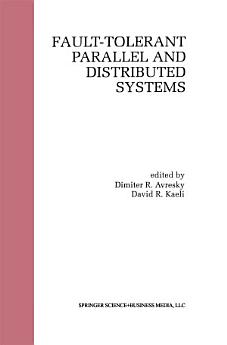Fault-Tolerant Parallel and Distributed Systems
Dimiter R. Avresky · David R. Kaeli
ডিচে ২০১২ · Springer Science & Business Media
১.০star
১ টা পৰ্যালোচনাreport
ইবুক
401
পৃষ্ঠা
reportমূল্যাংকন আৰু পৰ্যালোচনা সত্যাপন কৰা হোৱা নাই অধিক জানক
এই ইবুকখনৰ বিষয়ে
The most important use of computing in the future will be in the context of the global "digital convergence" where everything becomes digital and every thing is inter-networked. The application will be dominated by storage, search, retrieval, analysis, exchange and updating of information in a wide variety of forms. Heavy demands will be placed on systems by many simultaneous re quests. And, fundamentally, all this shall be delivered at much higher levels of dependability, integrity and security. Increasingly, large parallel computing systems and networks are providing unique challenges to industry and academia in dependable computing, espe cially because of the higher failure rates intrinsic to these systems. The chal lenge in the last part of this decade is to build a systems that is both inexpensive and highly available. A machine cluster built of commodity hardware parts, with each node run ning an OS instance and a set of applications extended to be fault resilient can satisfy the new stringent high-availability requirements. The focus of this book is to present recent techniques and methods for im plementing fault-tolerant parallel and distributed computing systems. Section I, Fault-Tolerant Protocols, considers basic techniques for achieving fault-tolerance in communication protocols for distributed systems, including synchronous and asynchronous group communication, static total causal order ing protocols, and fail-aware datagram service that supports communications by time.
মূল্যাংকন আৰু পৰ্যালোচনাসমূহ
১.০
১ টা পৰ্যালোচনা
এই ইবুকখনক মূল্যাংকন কৰক
আমাক আপোনাৰ মতামত জনাওক।
পঢ়াৰ নির্দেশাৱলী
স্মাৰ্টফ’ন আৰু টেবলেট
Android আৰু iPad/iPhoneৰ বাবে Google Play Books এপটো ইনষ্টল কৰক। ই স্বয়ংক্রিয়ভাৱে আপোনাৰ একাউণ্টৰ সৈতে ছিংক হয় আৰু আপুনি য'তে নাথাকক ত'তেই কোনো অডিঅ'বুক অনলাইন বা অফলাইনত শুনিবলৈ সুবিধা দিয়ে।
লেপটপ আৰু কম্পিউটাৰ
আপুনি কম্পিউটাৰৰ ৱেব ব্রাউজাৰ ব্যৱহাৰ কৰি Google Playত কিনা অডিঅ'বুকসমূহ শুনিব পাৰে।
ই-ৰীডাৰ আৰু অন্য ডিভাইচ
Kobo eReadersৰ দৰে ই-চিয়াঁহীৰ ডিভাইচসমূহত পঢ়িবলৈ, আপুনি এটা ফাইল ডাউনল’ড কৰি সেইটো আপোনাৰ ডিভাইচলৈ স্থানান্তৰণ কৰিব লাগিব। সমৰ্থিত ই-ৰিডাৰলৈ ফাইলটো কেনেকৈ স্থানান্তৰ কৰিব জানিবলৈ সহায় কেন্দ্ৰত থকা সবিশেষ নিৰ্দেশাৱলী চাওক।




